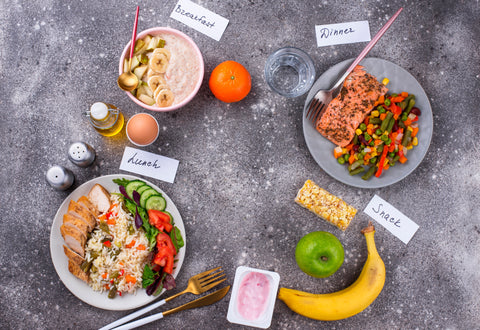Your cart is empty

Understanding Post-Meal Fatigue: Causes and Strategies for Prevention
🎧 On the go? Listen to The GOOD IDEA Audio Blog, available on Spotify or Apple Podcasts.
Have you ever polished off a big meal, only to find yourself struggling to stay awake at your desk? That familiar, dreaded food coma is what we call post-meal fatigue, and it’s a common issue that can put a dent in your day.
This profound post-meal tiredness can last anywhere from a few minutes to a couple of hours, and while it’s more likely to occur after big meals, it can just as easily follow a regular-sized serving. But why does this post-meal drowsiness happen, and what can we do to avoid it?
In this comprehensive exploration, we’re breaking down the causes of post-meal fatigue, offering strategies to prevent it, and providing tips to maintain energy levels throughout your day. Whether you’re a food enthusiast, health devotee, or just someone looking to understand and improve your eating habits, this is your guide to conquering the after-meal drag.

Causes of Post-Meal Fatigue
Post-meal fatigue can be heavily influenced by what, when, and how you eat. Here, we dissect the leading culprits behind those mid-day slumps so you can identify your triggers and make informed dietary adjustments.
Culprit #1: Digestive Processes and Energy Usage
Digestion is a complex process that requires significant amounts of energy. The body redirects blood flow to the stomach and small intestine to aid in breaking down food, which can leave you feeling tired after eating. Specific macronutrients like fats and proteins take longer to digest, further draining your energy reserves.
Culprit #2: Blood Sugar Fluctuations
The body is generally slower to digest complex carbohydrates, such as vegetables and whole grains (resulting in a gradual rise in blood sugar, followed by a gradual fall)...
In contrast, simple carbohydrates (fruit juices, sweets, baked goods, and ultra-processed foods) are rapidly digested. As a result, you absorb a large amount of glucose at once. This means that as blood sugar quickly spikes, you can expect it to fall at the same rate, sometimes called a "crash."
It’s these extreme spikes and crashes in blood sugar caused by simple carbohydrates that can be the culprits to low energy levels, concentration difficulties, and other symptoms.
What Is Blood Sugar and Why Does It Matter?
Blood sugar (or blood glucose) is one of the main sources of energy for your body's cells. It comes from the carbohydrates you eat and is essential in maintaining healthy brain function, muscle movement, and overall bodily functions. Your body works tirelessly to keep blood sugar levels within a certain range, as too little or too much can have adverse effects on your health.
We can see a direct link between blood sugar and fatigue in those with type 2 diabetes. Having type 2 diabetes, for example, can cause insulin resistance. This means your body cannot effectively use insulin to regulate your blood sugar and keep it within a healthy range. As a result, glucose builds up in the bloodstream instead of being used for energy.
What Factors Contribute to Stable Blood Sugar?
Maintaining a balanced diet that includes complex carbohydrates, fiber, protein, and healthy fats can help stabilize blood sugar levels. Regular exercise and managing stress also play important roles in regulating blood sugar.
In the case of type 2 diabetes, increasing insulin sensitivity would be an essential step in maintaining healthy blood sugar levels, in turn, preventing spikes and crashes.

Dehydration
Being dehydrated can also contribute to a post-meal slump. Water plays a crucial role in nearly all bodily functions, including digestion and energy production. Without enough fluids, your body may struggle to efficiently break down food and transport important nutrients to cells for energy.
How Much Water Should I Drink?
The amount of water you need varies depending on factors such as body weight, activity level, and climate. A general rule of thumb is to aim for at least 8 glasses (64 ounces) of water per day.
Food Choices and Portion Sizes
Certain types of food can slow down digestion and lead to a more extended period of tiredness post-meal. Large portions can overwhelm the digestive system, exacerbating the energy drain. Being mindful of the types and quantities of food you consume can help prevent post-meal fatigue.
What's an Ideal Sized Portion?
Portion sizes can vary depending on individual needs and dietary preferences, but a general guide is to fill half your plate with fruit and vegetables, one-fourth with protein, one-fourth with complex carbohydrates, with a side of dairy.
Strategies for Avoiding That Post-Lunch Dip
Now that we’ve identified the root causes, it’s time to explore actionable solutions. By incorporating these strategies into your eating routine, you can bypass the post-meal snooze and sustain more consistent energy levels.

Balanced Meals: The Key to Steady Energy Levels
Crafting balanced meals that contain a mix of complex carbohydrates, lean protein, and healthy fats can help regulate blood sugar levels and provide a more sustained release of energy. Incorporating fiber-rich foods can also slow digestion and prevent rapid energy crashes.
Amino Acids and Why They Matter
Amino acids are the building blocks of protein and play essential roles in metabolism and energy production. Eating a variety of protein sources, such as lean meats, legumes, and dairy products, can help ensure you're getting all the necessary amino acids for optimal energy levels.
Some amino acids you'll want in your diet are:
This essential amino acid is known for its role in muscle protein synthesis, but it also helps regulate blood sugar levels and may aid in improving energy levels.
L-isoleucine
Like leucine, isoleucine also plays a part in muscle protein synthesis and can help prevent fatigue during exercise by enhancing glucose uptake into muscles.
Not only does valine aid in muscle growth and repair, but it also helps maintain blood sugar levels and may improve mental focus.
This amino acid supports gut health and can help regulate energy production by aiding in the digestion of fats and carbohydrates.
Lysine is crucial for the production of carnitine, a molecule responsible for transporting fatty acids into cells to be used as energy. It also plays a role in calcium absorption and collagen synthesis.
Regular Meals and Snacks: Keep the Fires Burning
Skipping meals can lead to blood sugar dips, causing you to feel tired after eating. Eating regularly, including healthy snacks, can maintain a constant supply of nutrients and prevent energy lulls.
Stress Management and Quality Sleep: The Ultimate Energy Enhancers
Chronic stress and poor sleep are major contributors that lead to feeling tired. Finding ways to manage stress and getting enough sleep can significantly impact your daily energy levels.

Tackling Post-Meal Fatigue with Good Idea Drinks
If you’re looking for a delicious and practical way to help prevent energy crashes, consider adding GOOD IDEA – specifically formulated to reduce blood sugar spikes and crashes – to your menu.
Unlike the average soft drink, GOOD IDEA contains a blend of amino acids and minerals that have been scientifically shown to reduce blood sugar spikes after a meal by an average of 25%. This helps to contribute to more sustained and balanced energy levels.
With flavors ranging from Wild Raspberry to Swedish Lemon, this innovative beverage is the perfect complement to your meals, providing a refreshing and functional drink choice to add to your anti-fatigue arsenal.
FAQs
Q: Do certain foods or drinks have a greater impact on post-meal fatigue?
A: Yes, foods high in simple carbohydrates and processed sugars can cause a rapid spike in blood sugar levels, followed by a crash. Similarly, consuming alcoholic drinks can also lead to post-meal fatigue due to its tendency to have high levels of sugar.
Q: Are there any natural supplements that can help with post-meal fatigue?
A: Yes, supplements containing amino acids like L-glutamine, L-arginine, and L-carnitine play a crucial role in supporting energy levels. These amino acids are known to assist in the production of ATP, the primary energy molecule in the body, which fuels various cellular processes.
By aiding ATP production, these supplements help enhance overall energy levels, making them beneficial for individuals looking to boost their vitality and stamina.
Q: Can food intolerances cause post-meal fatigue?
A: Food intolerances can lead to inflammation in the body, which can contribute to fatigue. If you suspect a food intolerance may be causing your post-meal fatigue, consider keeping a food diary and speaking with a healthcare professional for proper diagnosis and management.
Q: How long does post-meal sleepiness typically last?
A: The duration of post-meal fatigue can vary depending on the individual and the specific meal. Generally, it can last for a few hours, but it is crucial to monitor your energy levels and address any underlying causes if it persists.
Q: What is GOOD IDEA drink?
A: GOOD IDEA is a functional beverage scientifically shown to help reduce blood sugar spikes after meals. With a formulation backed by over 20 years of research, it contains a blend of amino acids and minerals that can help maintain balanced energy levels throughout the day.

Q: How much sleep is considered a proper night's sleep?
A: On average, adults should aim for 7-9 hours of sleep per night for optimal rest and rejuvenation. Sleep is not a single state but rather consists of different stages. These stages are categorized into non-REM and REM sleep, with each stage serving a specific purpose in the body.
Non-REM sleep can further be divided into three stages, with the first two being light sleep and the third being deep sleep. Deep sleep is crucial for restoring energy and repairing tissues in the body.
REM sleep, also known as dream sleep, is important for memory consolidation and emotional processing. A healthy balance of all these stages is necessary to wake up feeling well-rested and energized.
(For tips on improving your sleep quality, check out our blog post here!)
Conclusion
Post-meal fatigue is a common experience, but it doesn't have to be a daily struggle. By incorporating nutrient-dense foods, managing stress and sleep, and adding functional beverages like GOOD IDEA to your routine, you can combat post-meal fatigue and maintain steady energy levels throughout the day.
Remember to listen to your body, pay attention to what you're eating, and seek professional help if you're experiencing persistent fatigue. With the right habits and resources, you can say goodbye to post-meal crashes and hello to sustained energy and vitality!
- Choosing a selection results in a full page refresh.


